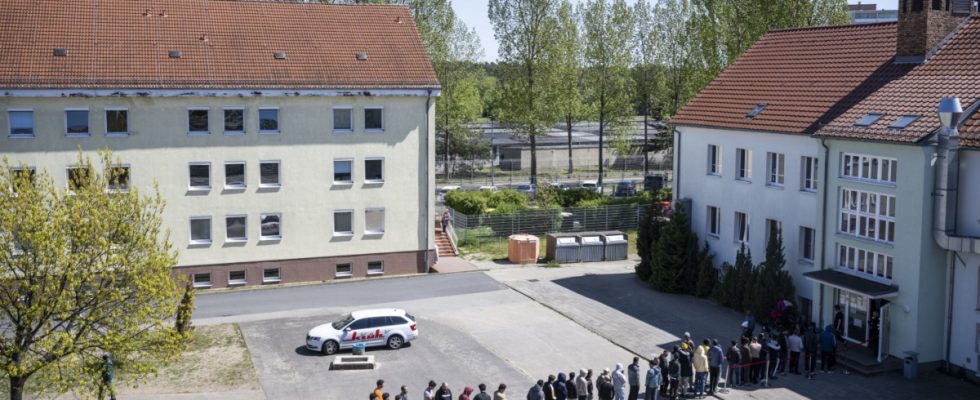In the dispute over refugee policy, the federal states have drawn up their own draft resolution before a top-level meeting with Chancellor Olaf Scholz planned for Wednesday. In the paper that the Süddeutsche Zeitung is available, they are emphatically demanding that the federal government contribute significantly more to the costs. At the same time, they demand measures to effectively limit immigration to Germany.
The mere fact that the federal states go into the deliberations with their own draft shows how far apart the positions differ, especially on the question of financing. The Chancellery had also drawn up such a document, but the federal states apparently did not consider this to be a suitable basis for discussion. The draft of the prime ministers reads like an affront to the federal government of Chancellor Olaf Scholz (SPD), which refuses to contribute significantly more money to financing the costs for refugees.
Financing adjusted to refugee numbers
In the paper, the states insist that the federal government transfers much more to them and the municipalities. “The Chancellor and the heads of government of the federal states agree that the migration movements of recent years are a lasting development,” says the draft. The total of 2.75 billion euros promised by the federal government in November 2022 for the current year, of which around 1.5 billion are intended for war refugees from Ukraine, “does not do justice to the increasing number of refugees,” it says paper of the countries. Only the Greens in the traffic light coalition have agreed to contribute more to the costs; there is sympathy for this in parts of the SPD.
The countries require a financing model “that is appropriate in terms of amount and adapts to changing refugee numbers”. They make four core demands: full reimbursement of costs for accommodation and heating for refugees and a general monthly per capita flat rate for accommodation and care in accordance with the Asylum Seekers Benefits Act. In a paper from the finance ministers’ conference, an amount of around 1,000 euros was mentioned on Sunday.
In addition, they demand a reliable assumption of the costs for the integration of all refugees and unaccompanied minors. The federal states demand that the federal government must expand the advice for refugees, initial orientation and integration courses of the Federal Office for Migration and Refugees “both quantitatively and qualitatively to meet needs”. The recognition of professional qualifications must be simplified in order to facilitate integration into the labor market.
The federal government accuses the states of playing backwards
The federal government’s proposal, on the other hand, said that due to the tight budget situation, it was no longer possible to provide additional help. The federal government pointed out that it bears almost all of the social benefits for 80 percent of the refugees. Most of the refugees came from Ukraine (1.06 million out of a total of 1.36 million refugees). Since June 1, 2022, the federal government has assumed about 90 percent of the services for these, since refugees from Ukraine in need of help have received citizen benefits or social assistance. The federal government spent around three billion euros on this in 2022 and around five billion euros in 2023.
The federal states and municipalities would also be given federal real estate to accommodate refugees – currently 340 properties with around 70,000 accommodation places. Federal states and municipalities would not have to pay rent for these buildings. The states are now asking the federal government to provide more real estate and to bear the costs if buildings have to be renovated. In addition, exemptions for accommodation in the building law are to be extended and the awarding of public contracts for the construction of accommodation, schools or day-care centers is to be simplified.
Regarding the demands of the federal states that the amount of the amounts for the four pillars mentioned must be subject to dynamic adjustment, the federal government said that the federal states themselves had pushed for the linking of the amount of payments to the number of refugees to end when these were still falling. Now they wanted to return to this model because it was cheaper for them. The municipalities would also have increasing costs for schools anyway, because the number of students is increasing. Children of refugees would only contribute to a small extent to the growth.
More border controls, easier deportations
While the positions on the question of costs have hardened further, there is agreement in other areas or at least possible compromises can be identified. The federal states are demanding that the federal government work at EU level to process asylum procedures in the states on the EU’s external borders. This corresponds to the attitude of Federal Interior Minister Nancy Faeser (SPD) and is supported by other departments involved in the federal government. Both the federal and state governments also want procedures to be accelerated.
However, the Prime Ministers are also calling for the monitoring of internal borders in the Schengen area to be intensified and the temporary border controls with Austria, which have already been extended, to be extended to other border sections if necessary. The federal police must carry out veil searches at all German internal borders.
Legal regulations that prevent deportations or at least make them more difficult would also have to be adapted. For example, the federal states are demanding the extension of reasons for detention in asylum law, the extension of the maximum period of detention leaving the country and restrictions on the suspensive effect, objections and legal action against decisions on asylum law. This is remarkable because it is a joint positioning of all countries, including SPD-governed countries and those with government participation by the Greens, which apparently support these demands.

